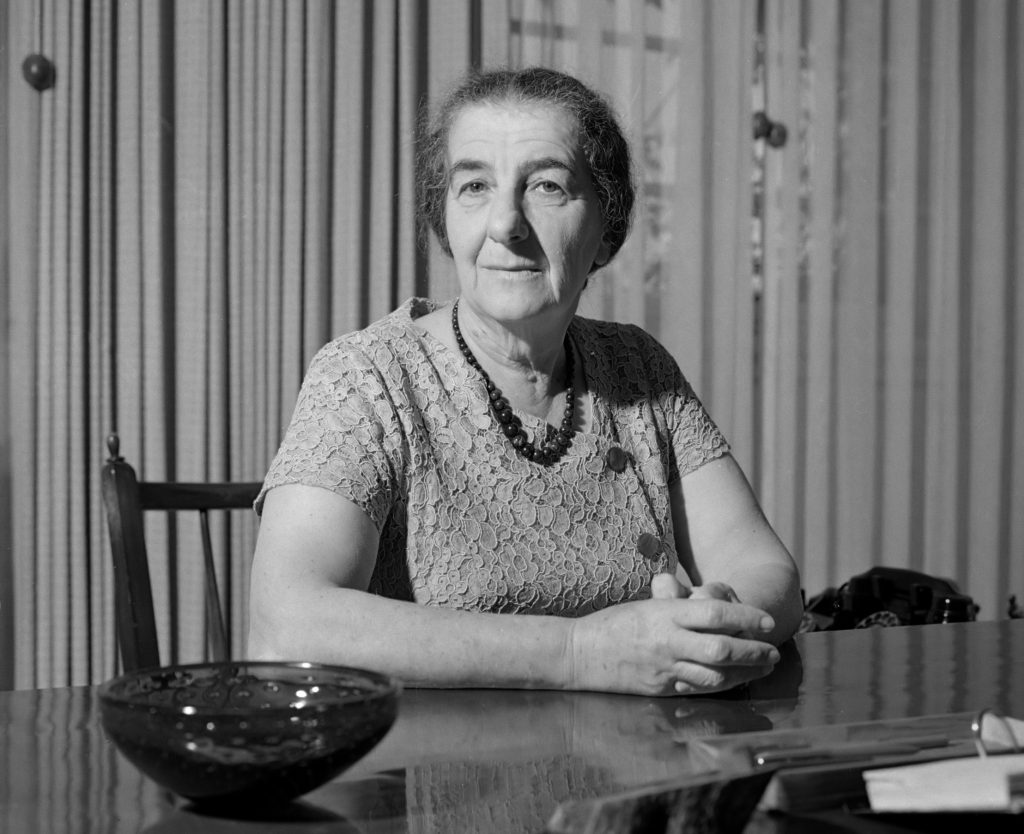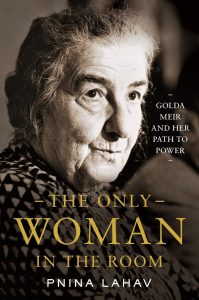Australia/Israel Review
Biblio File: Gold Meir, Feminist?
Oct 3, 2022 | Amy Spiro

 The Only Woman in the Room: Golda Meir and Her Path to Power
The Only Woman in the Room: Golda Meir and Her Path to Power
Pnina Lahav, Princeton University Press, Sept. 2022, 376 pp., A$62.99 (A$56.09 ebook)
Was Golda Meir a feminist? Were you to have asked the former Israeli prime minister – the first and still only woman to hold the job – the answer would likely have been no.
Throughout her lengthy career as an activist and politician, Meir, who served as Israel’s leader in 1969-1974, largely eschewed the label, despite having shattered Israel’s glass ceiling. Meir was so ahead of her time that almost 50 years later, nobody has managed to follow in her footsteps. But she also shied away from fully embracing the women’s rights movement, often viewing it as an impediment to other goals.
Now a new book from academic Pnina Lahav, titled The Only Woman in the Room: Golda Meir and Her Path to Power, seeks to re-examine Meir’s legacy through the lens of her gender and better understand how being a woman shaped her history, affected her decision making and influenced how she was viewed.
“She was blamed for the [Yom Kippur] war, she was blamed for other things, people didn’t like the way she looked, people didn’t like that she was old,” Lahav told Times of Israel in a phone interview from her home outside Boston.
“I wanted to look and see what was the truth here… and I came out with a feminist perspective, that a lot of what she did depended on the fact that she was a woman, and she was raised with the expectations of gender stereotypes, with the division of gender roles in society,” said Lahav.
Lahav, an Israeli-born emeritus law professor at Boston University, didn’t want to write just another biography of Israel’s fourth prime minister – whose life story is already well-trodden ground. In fact, she wanted to push back against some of the claims made by many of Meir’s biographers.
“They claimed that she was not a feminist and that nothing in her career was related to feminism,” said Lahav. “So I begin my book by pointing out that if she were a boy she would have studied [in school as a young child]. And it would have changed her life.”
From there Lahav traces Meir’s life and career with an emphasis on her groundbreaking position as a woman in what was undoubtedly a man’s world.
“At every step in her political career, whether she articulated it or not, she had to account for male discomfort with having assertive women in the public square,” wrote Lahav in the book.
Long before she became prime minister at age 70, Meir lived a life that did not fit the expected narrow path of marriage and motherhood for a girl born in the late 19th century.
As a young single woman, she obtained an illegal abortion in Chicago. After marriage, she waited seven years before having children. When her children were young, she left but did not divorce her husband, and moved to an apartment in Tel Aviv without him. She conducted a number of extramarital affairs with married men, and regularly left her children in the care of others while she worked gruelling hours.
As Labour Minister, Meir pushed through legislation granting women maternity leave paid for by the government. Yet she was also a strong advocate for the traditional family unit and a defender of motherhood and traditional values.
“Golda was a woman of contradictions,” wrote Lahav. “While she did not lead a traditional family life, she nevertheless retained a soft spot for the ideal.”
This contradiction is perhaps best seen in a 1972 interview that Meir granted to Italian journalist Oriana Fallaci, which Lahav cites. The reporter asked Meir how she felt about the common refrain that she was the “only man” or “ablest man” in David Ben-Gurion’s cabinet.
That phrase, Meir replied, was one “I’ve always found irritating, though men use it as a great compliment. Is it? I wouldn’t say so. Because what does it really mean? That it’s better to be a man than a woman, a principle on which I don’t agree at all.”
But just a moment later, Meir denounced the burgeoning feminist movement as “those crazy women who burn their bras and go around all dishevelled and hate men. They’re crazy. Crazy.” She also claimed to Fallaci that “to me the fact of being a woman has never, never, I say, been an obstacle.”
Those statements, Lahav argues in her book, “contained significantly more hyperbole than truth.” She suggests, instead, that Meir did not herself believe such things, but rather felt that she herself could not “stray too far from the Israeli consensus.” Lahav claims instead that Meir viewed women’s liberation as “a lovely idea but it lacked political support. For the foreseeable future at least, the glass ceiling was there to stay.”
Lahav notes herself, however, that her claim that Meir truly did support women’s liberation lacks “direct evidence”. Such supposition is dotted throughout the book, representing perhaps wishful thinking for a revisionist history.
The author repeatedly leans on speculation and circumstantial evidence rather than corroborated facts to re-examine Meir’s life. The phrases “it would not be far-fetched”; “one might also wonder”; and “it is not fanciful to imagine” detract from its otherwise fact-based claims.
“You don’t know what she might have thought if she didn’t write it down,” Lahav said of the missing pieces. “You have to think carefully about what you think happened here.”
Lahav noted that Meir did not write a wealth of letters throughout her life and career, leaving many questions unanswered and motivations unknown.
“The question is how do you know what she thought? You have to tell the reader honestly, ‘I don’t know exactly what she thought, but here is what I think and here is what I know.’”
It is impossible to examine Meir’s legacy without noting that close to 50 years later, Israel has never had another female prime minister. Some critics, including Lahav, lay some of the blame with Meir, who did not use her ground-breaking position in power to nurture or promote other female politicians.
As prime minister, Meir did not appoint a single woman to her cabinet, remaining, quite intentionally it seems, “the only woman in the room.” She sparred fiercely with Shulamit Aloni – the woman who later became the second-ever female minister in Israel – to the point where she intervened to keep her out of the Knesset by placing her in an unrealistic spot on the Alignment party list, a now-classic move in Israeli politics.
“I blame her for not seeing how important it is to be active in promoting women,” Lahav said. “[Her ministers] had this gender blindness, and she went along with it. It’s not that she was against women, she was not anti-feminist, but she wanted women to fight for their place in society, in a society which made it almost impossible to fight for a place.”
Amy Spiro is a reporter and writer with the Times of Israel. © Times of Israel (www.timesofisrael.com), reprinted by permission, all right reserved.
Tags: Israel






